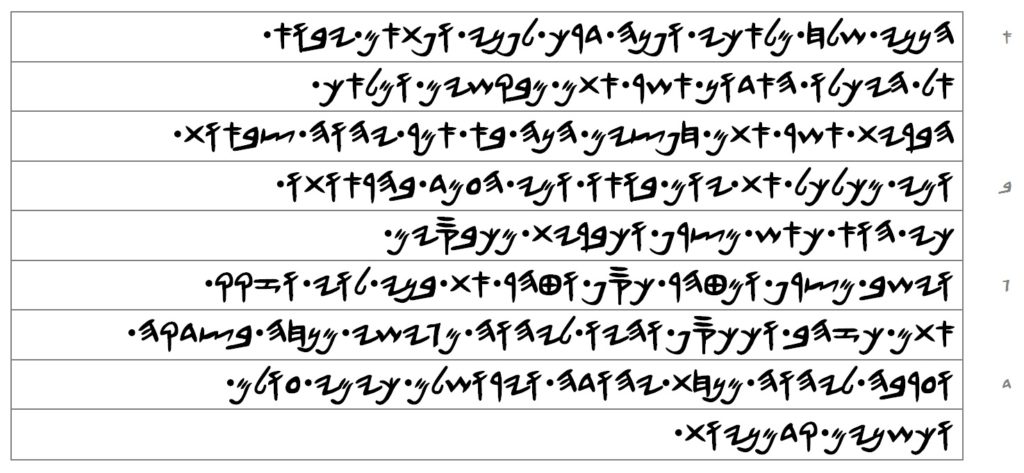

[1] hananay shalakh mal’ach-ay waa-panah darach la-panay wa-path’am yabo’ al haychalo ha-adon ashar atham mabakashaym wa-mal’ach ha-barayth ashar atham khapatsaym hanah ba’ amar YA’OH tsaba’oth
Behold, I am the one sending my messenger and he will prepare the way before me and straightway will He come to His tabernacle-palace the Lord whom you are the ones enquiring about; and the messenger of the covenant whom you ones look for, behold, he comes, says YA’OH of Hosts.
[2] wa-may machalchal ath yom bo’o wa-may haimad ba-hara’otho chay ho’ cha-ash matsarap wa-cha-barayth machabasaym
and who is the one sustained at the day of his coming, and who will stand when he is revealed? For he is like the fire of the one who refines and like the soap of the ones treading garments under water.
[3] waa-yashab matsarap wa-matahr chasap waa-tahr ath banay Lo’ay waa-zakak atham cha-zahb wa-cha-chasap waa-hay’o la-YA’OH magayshay mankhah ba-tsadakah
and he will sit a refiner and a purifier of silver, and he will purify the sons of Lo’ay and purge them as gold and as silver, and they will be unto YA’OH the ones who bring near the offering in righteousness.
[4] wa-gharabah la-YA’OH mankhath Ya’ohdah wa-Yaroshalam cha-yamay gholam wa-cha-shanaym kadamanay’oth
and pleasing unto YA’OH is the offering of Ya’ohdah and Yaroshalam like the days of old, and like the years of former times.
COMMENTARY OF MALACH-YA’OH 3:1-4
[Verse 1] Part of this verse is misquoted in the Greek version of the Matthew gospel (Mat. 11:10), but it is identical to the misquote in Mark 1:2 and in Luke 7:27. All of these misquotes in the Greek New Testament follow the Christian LXX version of the prophecy as translated into English below:
“Behold, I send my messenger before thy face, which shall prepare thy way before thee.”
Instead of the correct “before me” in the Ghabaray, the Greek versions have “before thy face” and “thy way before thee.” The Hebrew Matthew has the correct version of the prophecy of Malach-Ya’oh (Malachi) 3:1 at Mat. 11:10, but variations in the Shem-Tov manuscript evidence for this verse suggest that it was only added at a later point in order to bring the text of Shem-Tov’s Hebrew Matthew into harmony with the traditional Greek texts of the synoptic gospels.
In other words, Mat. 11:10 was not something Ya’ohshai actually said with respect to Ya’oh-khanan (John) the baptist. It was rather something the early gentile Christian church wanted to believe he said based on the intro of the earliest Greek gospel, the gospel according to Mark. This intro was then put onto the lips of Ya’ohshai in the other synoptic gospel accounts. The Christian interpretation of Malach-Ya’oh 3:1 has gaping holes in it, and it is now time that we deal with them.
Behold, I am the one sending my messenger and he will prepare the way before me. The announcement of this messenger rests upon the prophecy in Yashai-Ya’oh 40:3, as the expression waa-panah darach/ופנה דרך (“and he will prepare the way”), which is borrowed from that passage, clearly shows. The messenger is the servant whom Yashai-Ya’oh 42:1-7 promises to come as the type of Mashah (Moses), and the mediator of a new, perfect, and eternally-enduring covenant between YA’OH and Ya’oh-shar-al. He opens the eyes of the people but he is blind (to unrighteousness), he can hear with his ears but he is deaf (to wickedness), making him the ideal servant of YA’OH (Yashai-Ya’oh 42:19-21).
and straightway will He come to His tabernacle-palace the Lord whom you are the ones enquiring about. The messenger in verse 1 cannot be a prophecy of the appearing of John the Baptist, Christ’s harbinger who prepared the way before him, by calling men to repentance, for the simple reason that Christ is not the owner of the haychal (lit., tabernacle-palace). “The Lord” (ha-adon) in this passage must therefore be none other than YA’OH Himself; this is evident both from the fact that the Lord comes to His haychal, i.e., the temple of YA’OH, and also from the relative clause “whom you are the ones enquiring about,” which points back to the wearied question, “Where is the Higher Power of judgment?” (Mal’ach-Ya’oh 2:17). The fundamental flaw in the Christian interpretation of this verse is that we cannot consider Christ to be the owner of the haychal. It is not his. The haychal belongs to YA’OH alone. It is His house, not Christ’s.
The Second Temple was a smaller version of the First Temple destroyed by the Babylonians in 586 BCE that Cyrus of Persia ordered to be built in Yaroshalam (Ghazar’a [Ezra] 6:1-5), but he abandoned his word, did not enforce his decree, and did not see the project through to completion (Ghazar’a 5:4-5). Cyrus did not allow the Second Temple to be built to the same height as the First Temple. The Third Temple destroyed by the Romans in 70 CE was actually built in 22 BCE [1] by the Edomite king Herod the Great with the stated purpose of restoring and increasing the height of the Second Temple to be the same height as the First Temple in spite of the old Cyrus decree.
It is more than absurd to believe in the notion that Lord YA’OH was going to come reside in a house built by an Edomite who transgressed His laws and who also attempted to kill Christ in his infancy. Herod did not restore the Second Temple for the glory of YA’OH. He did it for his own glory. YA’OH was never coming to put His glorify in that house. He intends to put His glory in another house when He shakes the heavens and the earth (Khag-Ya’oh [Haggai] 2:6-9).
and the messenger of the covenant who you ones look for, behold, he comes says YA’OH of Hosts. The “messenger of the covenant” is identical with the person previously mentioned as mal’ach-ay/מלאכי (“my messenger”). He is the prophet like Mashah who the people were looking for (Thorah 5.18:15-19). Mashah built the first haychal in the first wilderness and it follows logically that a second Mashah will build the haychal in the second wilderness. The Lord comes to His haychal in order to dwell therein as King of Ya’oh-shar-al straightway after the messenger prepares the way of YA’OH in the second wilderness and builds the haychal in the second wilderness.
[Verse 2] and who is the one sustained at the day of his coming, and who will stand when he is revealed? The messenger cannot be Christ or John the baptist according to verse 2 because the coming of the messenger will be a time when peoples’ lives are put in great peril all around the world. That was not the case when Christ and the baptist were here.
The question “who is sustained at the day of his coming” has a negative meaning, i.e. very few if any will survive the day of his coming, for the coming of the messenger will usher in the wonder years for a time, times, and a half. This is the day of vengeance when YA’OH destroys the world by catastrophic cataclysms. Those who are with the messenger where he is will obviously be sustained and will stand, but a question mark looms over everyone else’s fate who is not with the messenger. Who can stand up under the burden of this judgment? The ones who escape the sword and flee to the wilderness where they find grace (Yaram-Ya’oh 31:2).
For he is like the fire of the one who refines and like the soap of the ones treading garments under water. This fire that the messenger is like is the fire of the refiner that destroys impurities among precious metals. This is another negative. The messenger is the leader of the remnant nation that has made an Exodus to the wilderness and who will call down fire from heaven from the wilderness to smite the inhabitants of the earth during the wonder years. As it is written: “If any man would hurt them fire proceeds out of their mouths and devours their enemies…” (Khazon 11:5).
Thus, the messenger has the rokh of Al-Ya’oh (Elijah) upon him (2 Kings 1:10-12). He is also like the soap used by those who wash garments by treading them under their feet beneath water. This imagery is also negative. The messenger comes to destroy people by fire and to destroy people by detergent as they are being trampled beneath his feet and submerged under water. Fire and soap treading beneath water are symbols of the catastrophic meteorological and weather related phenomena that will occur during the wonder years when the messenger is testifying from the wilderness.
[Verse 3] and he will sit a refiner and a purifier of silver, and he will purify the sons of Lo’ay and purge them as gold and as silver. The messenger is also a refiner and a purifier in a positive way. In what manner did Christ or John the baptist purify the tribe of Lo’ay (Levi) when they were here? In no manner did they when they were here is the answer. They in fact never singled out any tribe of Ya’oh-shar-al for cleansing and purification. They did not refine and purify the Lo’aym to make them as gold and as silver. This is the job of the messenger and not of Christ or John the baptist. The messenger will restore the tribe of Lo’ay by putting the tribe back together again, and by teaching these priests to properly execute the duties they will perform in the haychal according to the laws of the haychal written by Mashah in Thorah.
and they will be unto YA’OH the ones who bring near the offering in righteousness. The messenger will purge the Lo’aym as gold and as silver are purged so that they are going about their daily routines inside the haychal exactly as the law prescribes after the haychal is built by the messenger in the second wilderness. The Lo’aym will bring the offerings of YA’OH to His altar in the haychal in righteousness.
[Verse 4] and pleasing unto YA’OH is the offering of Ya’ohdah and Yaroshalam like the days of old, and like the years of former times. Again, neither Christ nor John the baptist ever did this. We must absolutely infer from verses 3 and 4 that the prophet Mal’ach-Ya’oh (Malachi) who wrote these words believed that the tabernacle service of the Lo’aym would be terminated at some point (in 70 CE from hindsight) but later revived again during the days of the messenger. The prophet’s words are not to be explained from a nonsensical “spiritualized” Christian point of view that it was just the custom of the prophets to utilize the old forms of so-called Old Testament worship in order to depict the reverence for God. His words are factual and substantive. He is telling us that the messenger will restore all things to be as they once were in the days of old. The sacrificial offerings of the people of Ya’oh-shar-al, meaning all twelve tribes plus Lo’ay mentioned under the catch phrase “Ya’ohdah and Yaroshalam,” will be pleasing unto YA’OH once again in His haychal when He comes suddenly to His haychal the day it is built in the second wilderness.
All of this, of course, is an anathema to the Christian doctrine that says Christ did away with the need for sacrifices and offerings by dying on the cross. It is time to throw the satanic Christian doctrine into the trash where it belongs. I am telling you what my Rock has told me, and my Rock has a fearful and glorious name.
His name is YA’OH
Always has been. Always will be.
#EXODUS2023
1.15.7252 (April 5, 2023)
Footnote:
- For the date when Herod the Great built the Third Temple in Yaroshalam, see Josephus, Antiquities, 15.11.1. As for the absolute dating, the seventeenth year of Herod counting from his capture of Yaroshalam in 36 BCE when Ceasar Augustus visited Syria was 20 BCE (Jos., Antiq., 15.10.3; Dio Cassius, liv. 7. 4-6.), but when Josephus corrected the date of the building of Herod’s temple to his eighteenth year in 22 BCE he was counting from Herod’s appointment as king by the Roman senate in 39 BCE. This was also Herod’s fifteenth year when counting from his capture of Yaroshalam in 36 BCE (Jos., Wars, 1.21.1).
